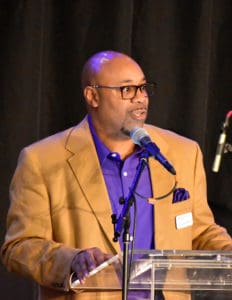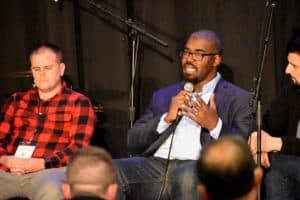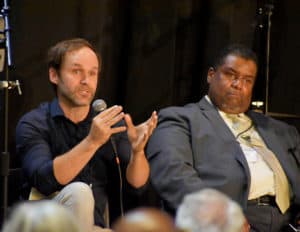HARRISBURG, Pa. (BRN) — As part of the Baptist Resource Network of Pennsylvania/South Jersey annual meeting, Larry Anderson, BRN director of healthy churches and the lead pastor of Great Commission Church, Philadelphia, moderated a panel about racial reconciliation.
The panel consisted of Ezra Strickhouser, pastor of Riverside Community Church, Horsham; John Cope, pastor of Keystone Fellowship, Souderton; Kyle Canty, Send City missionary in Philadelphia; Josh Crans, pastor of Providence Church, Coatesville; Hal Hopkins, church planting catalyst in Philadelphia; and Joe Velarde, pastor of Riverbend Community Church in Allentown.

The racial reconciliation cohort was started two years ago with twelve pastors, said Anderson, explaining the long period of gathering together allowed them to develop a culture of trust with one another. He admitted, at first, there was a lot of ignorance and arrogance on all sides, but ultimately the pastors developed a deep love for one another, similar to how Jesus Christ loves the church.
Anderson began the discussion by asking the panel, “What has changed in your heart, life and church since you began this journey?”
Velarde said he learned the power of presence. Though he is usually quick to do something, he learned to have patience with the process.
“We need to know what is the work, before we get to work,” he explained, acknowledging knowing it required walking alongside people from different backgrounds and listening and repenting.

Canty admitted to being emotionally exhausted by racial reconciliation groups in the past, but confessed that after two years of being together with this group, his heart had softened.
“I felt whole,” he shared. “I’ve found healing through these relationships.”
Crans said being a part of the group was an incredible blessing. Even though he planted in a low income, minority neighborhood, he said he still had so much to learn. He said he needed to “shut up and listen and allow God to do the work only He can do.” Quoting John 13:35, that the followers of Jesus would be known by their love, he said enthusiastically, “We get to display that! That’s the gospel on display!”
Anderson’s next question was on how their preaching had changed as a result of being a part of the cohort.

Noting his church in the suburbs of Philadelphia is home to both political extremes, Strickhouser explained that Jesus doesn’t fit neatly into either political agenda and that following him allows for a diversity of political opinion. Adding that our role as preachers is to “comfort the disturbed and disturb the comfortable,” he explained the preachers must, “challenge beliefs and push people toward Kingdom living.” He concluded by saying that the darker the culture seems, the more Jesus’ counter-cultural agenda stands out.
Anderson agreed, saying one of the things he was passionate about when he joined the cohort was his desire to affect change.
“I wanted to do something. I just did not want to meet a few times and have things remain the same. I wanted to know what the point was. I wanted to see that there would be fruit from this,” he said.
Strickhouser shared how his church partnering with predominately African American churches to minister in the city of Philadelphia had excited the millennials in his church. He also added that working together reminded him of how much they have in common.
Noting his church has limited diversity, Cope shared he struggled to get them engaged in the church. But he himself is learning to listen. “I still don’t understand everything, “ he confessed, “but I’m listening.”
The panel ended with the participants praising God and thanking Barry Whitworth, the executive director of the Baptist Resource Network, for convening the cohort and encouraging this ongoing conversation. As a result of the discussions, there is a new initiative to encourage the partnership of churches from different backgrounds called Mansion Hope, a joint effort by the pastors to reach the underprivileged community of Strawberry Mansion with the gospel.
There are also plans to convene a similar cohort in the western region, and for new cohorts to be started with the other ethnic groups that make up our big, beautiful and diverse Baptist Resource Network family.